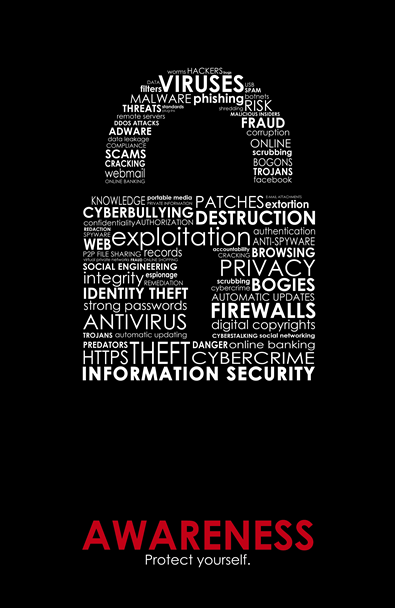Campus Security Awareness Campaign 2016
This post is part of a larger campaign designed to support security professionals and IT communicators as they develop
or enhance their security awareness plans. View the other monthly blog posts with ready-made content, as well as a printable calendar with the 12 topics.
Learn
more.
With spring break drawing near, now is the time to start educating your end users about how to protect their privacy when offline or traveling. Below are some ready-made messages and privacy tips you can use in your newsletter and social media communications with students, faculty, and staff.
Get the Word Out
Newsletter Content
Planning a spring break vacation? People are frequently more vulnerable when traveling because a break from their regular routine or encounters with unfamiliar situations often result in less cautious behavior. If this sounds like you, or someone you know, these five tips will help you protect yourself and guard your privacy.
- Track that device! Install a device finder or manager on your mobile device in case it's lost or stolen. Make sure it has remote wipe capabilities and also protects against malware.
- Avoid social media announcements about your travel plans. It's tempting to share your upcoming vacation plans with family and friends, but consider how this might make you an easy target for local or online thieves. While traveling, avoid using social media to "check in" to airports and consider posting those beautiful photos after you return home. Find out how burglars are using your vacation posts to target you in this infographic.
- Traveling soon? If you're traveling with a laptop or mobile device, remove or encrypt confidential information. Consider using a laptop or device designated for travel with no personal information, especially when traveling out of the country.
- Limit personal information stored on devices. Use a tool like Identity Finder to locate your personally identifiable information (e.g., SSN, credit card numbers, or bank accounts) on your computer, then secure or remove that information.
- Physically protect yourself and your devices. Use a laptop lock, avoid carrying identification cards, shred sensitive paperwork before you recycle it, and watch out for "shoulder surfers" at the ATM.

Use this image to support your messaging (click for larger image).
Social Posts
- Laptop phone home! Install a device finder on your mobile device in case it's lost or stolen. #TravelTip #Privacy
- Sketchy #phishing offers can arrive by e-mail, phone, snail mail, or in person. Be vigilant about social engineering hacks! #Privacy
- Traveling soon? Remove or encrypt personal info on your laptop or mobile device, especially when abroad. #TravelTip #Privacy
- Locate then lock #PII. Use a tool like @identityfinder to locate personal info on devices, then secure or remove it. #TravelTip #Privacy
- Physically protect yourself — Use a laptop lock, minimize cards in your wallet, shred sensitive papers, & be wary at ATMs. #TravelTip #Privacy
E-mail Signature
Ask staff to add a tip to their e-mail signature block and link to your institution's privacy guidelines.
Example:
John Doe
Chief Privacy Officer
University of XYZProtect your privacy when offline or traveling. Learn more. [Link "Learn more" to your institution's privacy guidelines or link to these privacy tips.]
Resources
Share these resources with end users or use them to inform your awareness strategy.
- Typographic Lock (poster) [Use something like this for caption above and link picture to Pinterest post.]
- Share It Right (2013 PSA video)
- Stay Safe on Public Wi-Fi Networks (2013 PSA video)
- Learn more about mobile device safety and general online safety habits from the STOP.THINK.CONNECT. campaign.
- Stay informed by following the FTC Scam Alerts. The FTC also provides tips on how to keep your personal information secure.
- Travel abroad safely. Read the State Department's report "Traveling with Mobile Devices: Trends and Best Practices" or the FBI brochure Safety and Security for the Business Professional Traveling Abroad.
- This Washington Post infographic and this Safe Internet Banking video clearly illustrate how hackers can use social engineering to their advantage.
Brought to you by the Awareness and Training Working Group of the EDUCAUSE Higher Education Information Security Council (HEISC).
© 2015 EDUCAUSE. This EDUCAUSE Review blog is licensed under the Creative Commons BY-NC-SA 4.0 International license.
